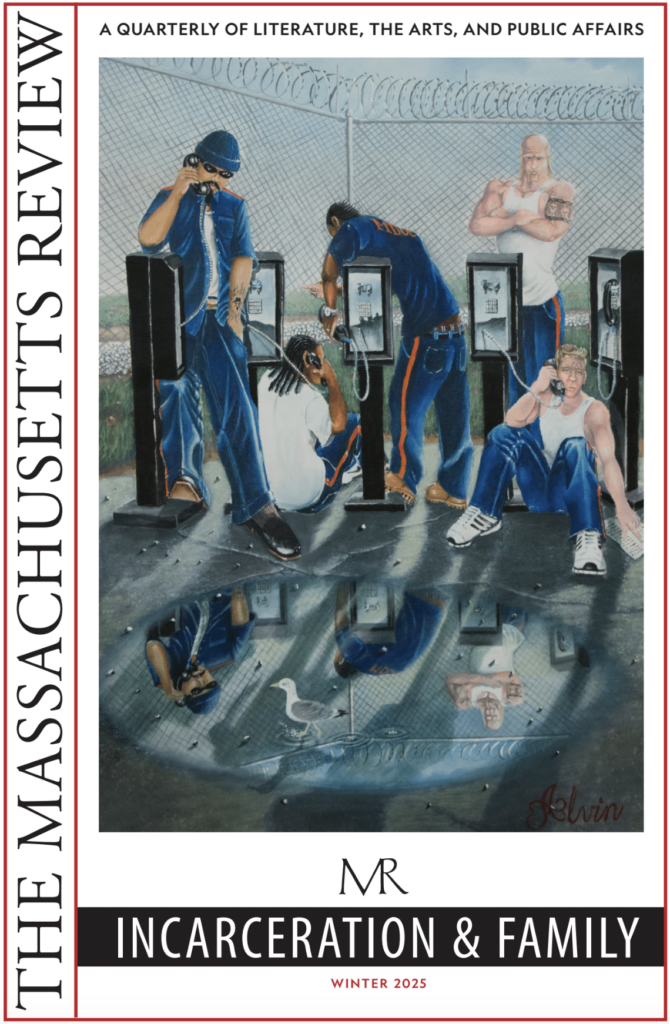Through Story We Persist

Editor’s note: April 16, 2025, on the campus of the University of Massachusetts Amherst, Abigail Chabitnoy– mentor for the Institute of American Indian Arts MFA in Creative Writing, poetry editor for the Massachusetts Review, and assistant professor of English at UMass Amherst—presented this year’s Oscar-nominated documentary, Sugarcane, directed by Julian Brave NoiseCat & Emily Kassie. A stunning tribute to the resilience of Native people and their way of life, Sugarcane is an epic cinematic portrait of a community during a moment of international reckoning. In 2021, evidence of unmarked graves was discovered on the grounds of an Indian residential school run by the Catholic Church in Canada. After years of silence, the forced separation, assimilation and abuse many children experienced at these segregated boarding schools was brought to light, sparking a national outcry against a system designed to destroy Indigenous communities. Chabitnoy prefaced the screening with the following remarks.
I’m not sure if this is quite what Jim Hicks, guest curator of this year’s Massachusetts Multicultural Film Festival, had in mind when he invited me at the start of the academic year to introduce this film. But here we go.
In academia they say that April is the cruelest month. This is the first year I felt it so acutely. Perhaps it was the workload. The number of thesis defenses. The reading loads of my own class designs. External commitments for tenure applications, manuscript reviews, outside mentees. Perhaps it was the crushing weight of democracy visibly cracking in our time. And yet, none of what has led some to call these times “unusual” is really new. We forget, because we have been made to forget, because our public curriculum has been designed to coax us to forget, that despite the most noble intentions and ambitions of this nation’s founding, our Constitution reified inequality in its foundation, and that foundation was laid on the ground of ongoing genocide.
We forget that the Nazis looked to our own treatment of Indigenous peoples and work in “eugenics” to advance their own genocidal ambitions.
We forget that before there was Canada and the United States, there were peoples and communities that moved freely and necessarily across this imposed border, who saw the land and neighboring communities as kin. We forget that manifest destiny moved east to west well before any northern or southern borders were established. And we forget that the first Indigenous Boarding School was established at the site of a former military barracks, now occupied and operated by the United States Army once more, in Carlisle, Pennsylvania.
In 1901 my great-grandfather was sent from his home and his kin in Kodiak, Alaska, to the Carlisle Indian Industrial School, founded by General Richard Pratt after an experience with prisoners of war down south and under the guiding indictment to “Kill the Indian, Save the Man.” And because my great-grandfather was already an orphan; because he was 15, and tall, and a baseball player, and so better fed, and so, not an easy mark, and so the face of “success,” for years I was reminded of how fortunate he was to have been given such an opportunity.
He died before his second son was born, of tuberculosis. A common takeaway from boarding schools. No one told his sons of their father. No one “talked about the Indian” in the family. And when those sons— my grandfather and my great-uncle—grew up and were called “half-breeds,” they’d get “blitzed” on beer while my father and his cousin played games in another room. And no one in my family told stories.
The film Sugarcane tracks one of “the lucky ones”, and his son. It tracks how family stories are—or are not—told. The people featured in Sugarcane are living still. This is not ancient history. And watching it, I am reminded that “survival” is a slippery term. I’m reminded that even those who came home saw horrors they would not, could not, speak of. Witnessed atrocities that multiple institutions conspired to bury. With “the best intentions.” I’m reminded that my family did not tell stories, that my great-grandfather never returned to the sea, to his home. I’m reminded that survival sometimes happens in pieces, and is not survival at all. And I’m reminded that through story we persist.
And lest you say “we didn’t forget,” lest you say “we didn’t know”—I ask you, were you looking? I, your community, ask you “were you present?”
So April was a cruel month. Because all of the burdens I suggested have one thing in common: they demand attention. They demand presence. They demand accountability and the kind of responsibility that community—real community—requires, more critical than any one individual’s “rights.” How do we show up in this moment in history for our community? How do we define that community? How do we hold ourselves accountable in this ongoing moment of reckoning we can hardly afford to put off much longer?
ABIGAIL CHABITNOY is the author of In the Current Where Drowning Is Beautiful (Wesleyan 2022), How to Dress a Fish (Wesleyan 2019), winner of the 2020 Colorado Book Award for Poetry and shortlisted in the international category of the 2020 Griffin Prize for Poetry, and the lino-cut illustrated chapbook Converging Lines of Light (Flower Press 2020). Abigail is a mentor for the Institute of American Indian Arts MFA in Creative Writing and an assistant professor at UMass Amherst. She is a Koniag descendant and member of the Tangirnaq Native Village in Kodiak.



